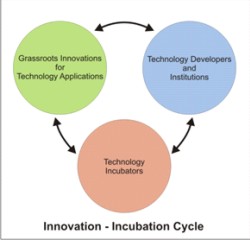|
Technologies for Rural Communication
Rural
India faces a severe technology deficit. Though there are other serious
shortages like health facilities, water, education etc. which are known
and dealt with, the role of technology in solving these and other
problems is barely acknowledged. Grassroot Community Based Organisations (CBOs) have always used traditional communication methods to reach out to their beneficiary communities for fostering development processes. Increasingly the need for two-way communication processes to understand community needs and package relevant knowledge for community empowerment has become important. This enables dialogue and allows communities to speak out, express their aspirations and concerns and participate in the decisions that relate to their development. It also provides a platform to the weaker sections to share and express their concerns and access important information about public programmes and schemes. Development Alternatives has recognised that new technologies can help in better communication for development processes and also enhance the quality of their outreach and impact. Lack of technical knowledge and assistance, limited access to internet connectivity and poor infrastructure facilities are the main challenges faced by grassroots development communicators in Community Based Organisations.
In order to overcome these challenges,
Development Alternatives has partnered with Ford Foundation to explore
technological innovations for CBOs to enhance the outreach and
engagement with their beneficiary communities and increase the
efficiency of their operations. Some of the major issues which emerged
during various interactions with Community Based Organisations and
grassroots community communicators included: • Limited technical information available and inadequate capacities to access technical information. • Complete dependence on outside help for any technical issue or need.
• Need for a mechanism to generate database of communities and enhance the awareness process. Development Alternatives designed a robust mechanism to identify and collect technology innovations through a competitive method of technology incubation support to innovators and then linked them to potential users of these technologies amongst the CBOs which were surveyed. A total of 16 innovators responded with a variety of technology proposals. Out of these 7 technologies were selected by a panel of experts. 5 of these were mobile based apps while the other two were hardware technologies.
The technologies after customisation were
piloted in the communities by the CBOs along with the technology
innovators to understand the feasibility and scalability of the
technologies. The technologies were piloted among a varied group of
stakeholders which included students, health workers, women etc. These
technologies addressed not just the technical challenges but also found
relevance with the social issues like gender-based violence, sexual
harassment, HIV awareness etc. In the days to come, Development Alternatives plans to develop a web directory which will contain all the information related to technologies in development communication interventions. The organisation also plans to organise a policy workshop to broaden the base understanding of technological shift for communities. ■
Jyoti Shresth
|
